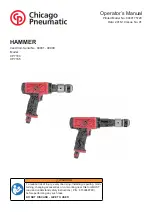
BASE –
Supports drill press. For additional stability, holes are
provided in base to bolt drill press to floor.
(See “Specific Safety Instructions for Drill Presses”)
BACKUP MATERIAL –
A piece of scrap wood placed
between the workpiece and table. The backup board prevents
wood in the workpiece from splintering when the drill passes
through the backside of the workpiece. It also prevents drilling
into the table top.
BELT GUARD ASSEMBLY
– Covers the pulleys and belt
during operation of the drill press.
BELT TENSION –
Refer to the “Assembly” Section,
“Installing and Tensioning Belt.”
BELT TENSION LOCK KNOB –
Tightening the knobs locks
the motor bracket support maintaining correct belt distance and
tension.
BEVEL SCALE –
Shows degree of table tilt for bevel
operations.Scale is mounted on the side of arm.
CHUCK –
Holds a drill bit or other recommended accessory to
perform desired operations.
CHUCK KEY –
A self-ejecting chuck key which will pop out
of the chuck when you let go of it. This action is designed to
help prevent throwing of the chuck key from the chuck when the
power is turned ON. Do not use any other key as a substitute;
order a new one if Damaged or lost.
COLUMN –
Connects the head, table, and base on a one piece
tube for easy alignment and movement.
COLUMN COLLAR –
Holds the rack to the column. Rack
remains movable in the collar to permit table support
movements.
COLUMN SUPPORT –
Supports the column, and provides
mounting holes for the column to base.
DEPTH SCALE –
Indicates depth of hole being drilled.
DRILL SCALE POINTER –
Indicates the drilling depth by
pointing to the depth scale.
DEPTH SCALE STOP NUTS –
Locks the depth scale to
selected depth.
DRILL BIT –
The cutting tool used in the drill press to make
holes in a workpiece.
DRILL ON/OFF SWITCH –
Has a locking feature. This
feature is intended to help prevent unauthorized and
possible hazardous use by children and others. Insert the key
into the switch to turn the drill press on.
DRILLING SPEED –
Changed by placing the belt in any of
the steps (grooves) in the pulleys. See the Spindle Speed inside
belt guard.
FEED HANDLE –
Moves the chuck up or down. one or two of
the handles may be removed if necessary whenever the
workpiece is of such unusual shape that it interferes with the
handles.
HEAD LOCKING SCREW –
Lock the head to the column.
ALWAYS lock head in place while operating the drill press.
RACK –
Combines with gear mechanism to provide easy
elevation of the table by the hand operated table crank.
REVOLUTIIONS PER MINUTE (R.P.M) –
The number of
turns completed by a spinning object in one minute.
SPINDLE SPEED –
The R.P.M. of the spindle.
SPRING CAP –
Adjusts the quill spring tension.
TABLE –
Provides a working surface to support the workpiece.
TABLE BEVEL LOCK –
Locks the table in any position from
0
°
- 45
°
.
TABLE CRANK HANDLE –
Elevates and lowers table. Turn
clockwise to elevate table. Support lock must be released before
operating crank.
TABLE SUPPORT LOCK –
Tightening locks the table
support to the column. Always have it locked in place while
operating the drill press.
TABLE SUPPORT –
Rides on the column to support the table.
WORKPIECE –
Material being drilled.
DRILL PRESS GLOSSARY
9
Summary of Contents for DP12LW
Page 7: ...CARTON CONTENTS 7 L M N O ...
Page 22: ...22 ...








































